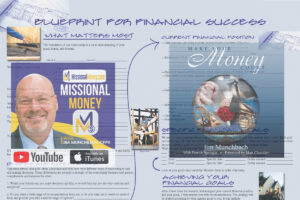Your Heart’s Desire
“To look at something as though we had never seen it before requires great courage.” —Henri Matisse, painter
I’ve met with hundreds of clients in every age group, and I’m convinced that good financial management doesn’t begin with a pen and a checkbook. It starts with a good evaluation of what’s in our hearts and minds. The choices we make with our money are a vivid portrait of our heart’s desires and our thoughts about life. If we have a good grasp of these things, we will be able to keep the attitudes that bring fulfillment and toss away those that hinder us.
Four Kinds of People
In my discussions with people about financial planning, I’ve noticed that they seem to fall into one of four groups. These groups describe attitudes, not the amount of money they have. For instance, some people are “buried in debt.” I know people who make $30,000 and fall into this category, but I also know people who make $1 million but spend $1.3 million each year. (Before long, being short $300,000 will catch up to you!) The amount of money isn’t the determining factor. Instead, the attitude about life and money determines which kind of person we are. Here are the four kinds of people:
Buried in Debt
Rick and Janice are both professionals in their 50s. He owns his own business, and she is an attorney. Together, they make over $250,000 a year, but they can’t seem to make ends meet.
Janice called me and scheduled an appointment. When they arrived at my office, the tension between them hung in the room like a storm cloud.
They blamed each other for their predicament, and they were furious! I asked them some questions about their goals and dreams, but all they could think about was getting their debts paid off. That’s a good start for people in their financial condition, so I asked them to show me the worksheet of their assets and liabilities so we could create a workable financial plan.
It was like pulling teeth. They had a hard time even thinking of what they owned and what they owed, so I methodically asked questions to uncover the facts.
In recent years, they had avoided this analysis like the plague because it was so painful to look at reality. It took a couple of sessions just to get most of the information we needed, but when we hit critical mass (and I realized I wasn’t going to get any more from them), we started working on their plan.
Almost immediately, Rick told me that his car was old and he needed a new one. We talked about the reality of the numbers on the balance sheet we had been working on, and I suggested that he buy a good used car. That, he assured me, was out of the question. “I have an image to keep up,” he insisted. “I need a brand new car . . . maybe a Lexus.”
As soon as he said the word “Lexus,” Janice blew up! She stood and yelled, “There you go again! All you care about is your ‘image.’ But you don’t realize how you’re ruining our lives!” She started walking out, and then she turned to me and said, “Jim, if you can’t fix this, I’m going to file for divorce.”
Some people have created their financial problems by their own poor choices, but others are buried in debt because they face difficulties that are beyond their control. I have a friend who was making about $40,000 a year and living modestly, but comfortably, with his wife and two children.
He’s a very responsible provider for his family, and he was slowly and steadily building his retirement fund. His wife got pregnant with twins, and he began making adjustments to make sure he had enough money for the delivery and the first years of the children’s lives. But as the delivery date approached, the doctor told them there were complications.
One of the twins had a heart defect and may not live to term. A month later, the children were born prematurely. One was healthy, but the other had severe heart problems. She was rushed to pediatric ICU, and surgery was scheduled as soon as possible.
Two weeks after the surgery, the little girl died. The half-million-dollar bill the hospital sent them compounded the family’s sadness. Through many negotiations, the hospital agreed to accept a fraction of the bill, but even the lower amount swamped the grieving parents. It took years, but they finally paid off these bills.
Many of those who are buried in debt, however, are like Rick and Janice, who have a “Santa Claus mentality.” For some reason, they believe that somebody, somewhere will magically come through for them whenever they have a need.
They have convinced themselves that they are going to win the lottery, that their boss will give them a huge bonus, or that Aunt Phoebe will die and leave all of her estate to them instead of her own children. With that assurance, they keep spending money like there’s no tomorrow.
A friend of mine has observed people like this, and he says they get a kind of “high” from spending. The euphoria they experience from buying new stuff fuels their desire to do it again and again. But like an addiction, no matter how much they get, it’s never enough.
Most people who are buried in debt suffer under atrocious credit card interest rates.
In a letter to a personal finance columnist, a man admitted he owed $12,000 in unsecured debt, and he was paying 29.99 percent. He said that he always tried to pay a little more than the minimum, “but the balance never goes down.” The writer responded with the discouraging news that at his current rate of payments, it would take more than 30 years to pay off his debt—if he didn’t buy anything else in those 30 years. *[From the article, “Dazed and in debt in the credit card maze,” by Joe Lee and Thomas Parrish, The Houston Chronicle, January 21, 2007.]
A generation ago, bank deregulation set off a race to sign up as many customers as possible, with the limits on interest rates significantly raised. Not surprisingly, many customers enjoyed the easy money credit cards afford, but they were shocked to find that the initial, reasonable interest rate skyrocketed when they were late with a payment. Getting those rates reduced is almost impossible. If they had read the fine print, they’d know that the credit card companies would charge those exorbitant rates.
Banks thrive on borrowers who are up to their eyeballs in credit card debt, but they make far less on the rest of us. In their article on this personal financial crisis, Joe Lee and Thomas Parrish explain: “In today’s strange alternative universe of credit card banks, the term ‘deadbeat’ refers not to the improvident borrower but to the solid citizen who prides himself on paying off his balance every month. . . .
What these lenders seek are ‘revolvers’ . . . who are likely to pay little more than the monthly minimum—and who eventually find themselves in thrall to mushrooming interest payments, abundantly garnished with late fees.”
We need to realize that banks’ ads may be attractive, but they don’t have our best interests at heart. Their corporate commitment to their shareholders is to make as much money as possible. They offer tantalizing promises of low interest rates to hook people, and then they hope those people will miss payments so the bank can raise their rates. And it’s perfectly legal.
For people who are buried in debt, thinking patterns tend to the extremes. Many, like Rick and Janice, refuse to even think about the negative consequences of their choices. They just drift along month to month hoping nobody will notice their mounting pile of unpaid bills. But then, when the collection agency sends a demand letter, panic replaces denial. For weeks or months, their minds are consumed day and night with fearful nightmares about a bleak future alternating with hopeful daydreams about magically getting bailed out. (“I hear Aunt Phoebe isn’t feeling too well!”)
Barely Above Water
Bob and Rachel, both in their late 20s, just got married. It was a beautiful wedding, and now the happy couple is off to make a life of their own. Both of them have good jobs, but since they graduated from college, they spent virtually every penny they made.
Sometimes they saved money for a special vacation, like the trip to Cancun, but they never had any cushion in their finances.
They didn’t feel euphoric when they spent money, but they didn’t have a clear vision for their future, either. All they cared about was staying out of debt and having some cash to buy some fun stuff if they could afford it. That philosophy of financial life seemed fine to them—until the transmission fell out of Rachel’s car, and they received a bill for over $2000.
People who are satisfied to be barely above water live “one paycheck from disaster,” and they almost never see it coming.
Often, these are young singles and couples who haven’t experienced health problems, and they haven’t owned a home so they haven’t had to pay for major repairs. But those of us who have struggled with these things could have told them that significant surprises are a part of life.
As a State Farm agent, I saw many families hit with all kinds of unexpected problems, such as car accidents, hurricanes, floods, fires, medical bills, and traffic tickets.
As we get a little older, we may face the death of a loved one who failed to provide enough money in his estate for a decent funeral. Today, a big expense many of us face is taking care of our aging parents. People who live barely above water aren’t prepared for any of these surprises. Even relatively minor setbacks, like the $2000 car repair, can devastate their financial world, and consequently, cause immense strain on the relationships they value.
Of course, I know several individuals and couples who make far more money than Bob and Rachel, but their goal is to enjoy as much pleasure and comfort as possible today. As long as they don’t go into debt (for too long, at least), they feel like they’re winning the game. They’re far more responsible than those who are buried in debt, and they aren’t in denial about their financial situations, but they lack a compelling purpose outside their own wants that could give them direction and fulfillment.
Young adults can find themselves at the painful juncture of incredibly high expectations and painful reality. Most of them grew up enjoying a lifestyle full of perks. Even in homes with modest incomes, a “normal” lifestyle included a lightning-fast MacBook, an Xbox or Game Boy, the latest iPhone, and of course, the latest fashions and plenty of money for movies, trips, and other kinds of entertainment.
Their experience with amenities and wealth created the expectation that they’d have even more when they graduated and went out on their own. Psychologist Jean Twenge, a professor at San Diego State University, wrote the insightful book, Generation Me: Why Today’s Young Americans Are More Confident, Assertive, Entitled—and More Miserable Than Ever Before. She notes, “There are a lot of young people hitting 25 who are making, say $35,000 a year, who expected they’d be millionaires or at least making six figures.” *[Quoted in The Houston Chronicle, “A generation obsessed with having more stuff,” by Martha Irvine, January 23, 2007.]
Many of these young adults spend every penny they make to maintain the lifestyle they’ve enjoyed, and they’re financially barely above water. Almost any unexpected expense sends them over the brink into debt. I know some young adults who experienced the pain of unfulfilled expectations. Some became disillusioned and bitter, but many of them used their disappointment as a steppingstone for change.
Not long ago, I came across a word that captures the disappointment that results from unrealistic expectations. Weltschmerz (pronounced velt-shmerts) is a German word that means, “Mental depression or apathy caused by comparison of the actual state of the world with an ideal state.” And as we all know, comparison kills. Realistic expectations, however, combat all the distorted thinking and the promises of advertising, and we can then make good choices based on truth and live with a profound sense of peace.
Sadly, when I talk to people who are barely above water about developing a financial plan, many of them tell me, “Oh, I don’t need that. What good would it do? I don’t have any extra money.” That’s precisely the reason they need one.
Bucks In The Bank, But Still Worried
In my own story, when I realized that living barely above water and buying lots of stuff didn’t provide real fulfillment, I changed course. Unfortunately, my solution was only to make a lot more money, not to find true purpose that could guide every aspect of my life, including my finances. When I became an insurance agent, I was determined to make as much money as possible. During that period of my life, I was the poster child for this category: I had bucks in the bank, but I always worried that I wouldn’t have enough.
Many of my clients and friends fall into this category. For some reason, they have an almost insatiable appetite for more. They realize there’s a lot of money out there just waiting for someone to come along with a good product or service and a little marketing savvy. Millions of dollars are waiting for them, and they’re determined to gather all they can. They’re willing to do whatever it takes to get what they want, and many of them sacrifice everything—family, health, hobbies, and even a measure of sanity—in the pursuit of a fatter bank statement. But it’s never enough.
I talked with a client who is fabulously wealthy, and we discussed his relentless chase for more money. After a while, I asked him, “What is it that you really want? What’s missing that you long for?”
He looked at me as if to say, Jim, that’s a dumb question. Don’t you know the answer already? Then he said simply, “Peace.”
Of course, not everybody in this category has great wealth. Most of them have a nice retirement fund through their company or their own investments, and they actually have a reasonable amount of money to do the things they enjoy. The issue with these people isn’t the number at the bottom of their balance sheet. It’s the fact that their significant resources aren’t directed by a strong sense of purpose. Without that benchmark, no amount of money ever seems to be enough to fill the hole in their hearts.
Full Of Purpose And Contentment
I have a few friends who are attentive about their financial health, but they don’t worry about it. They read and learn about investments, and they ask good questions to get the information they need. They use that information and a strong set of values to shape their choices about spending, investing, and giving wisely. These people have established their sense of purpose in life, and they measure every decision according to that purpose. They have learned that the secret of life is to live for a cause that’s much bigger than themselves, and they are terrific examples for their families, their friends, and everyone who knows them. They live with a strong sense of thankfulness that combats worry, pride, and consumerism.
Many years ago, a group of Christians exemplified this lifestyle of wisdom, prudence, and generosity. They were the Puritans. Today, most of us think of them as rigid and stoic, but that’s not the case at all. In my study of their lifestyle, I’ve been inspired by the depth of their commitment to a transcendent purpose and their sheer, unmitigated joy in seeing God use them to touch others’ lives. That’s really attractive to me!
They believed that everything they owned was a gift from God, and this perspective stimulated them to be responsible to use those gifts effectively and to celebrate God’s goodness to them.
They had a terrific balance of enjoying their resources and being wise financial managers who shrewdly invested to make more money. This combination of characteristics, coupled with their compassion for people in need, enabled them to be very generous.
I see a few people around me today who have those same perspectives, and I want to spend as much time with them as possible. They are committed to excellence, but they aren’t driven by an inordinate, insatiable desire to have more money, possessions, comfort, and pleasure. When they go home at the end of the day, they can rest because their hearts and minds are at peace.
They struggle with problems that we all face, but they can address those things from a personal history of wisdom, good communication with their spouse and kids, and trust that God is at work in the good times and bad.






